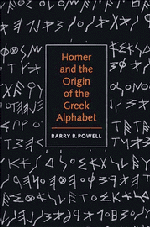Book contents
- Frontmatter
- Contents
- List of figures
- List of tables
- Acknowledgements
- Abbreviations
- A note on terms and phonetic transcriptions
- Chronological charts
- Maps
- Foreword: Why was the Greek alphabet invented?
- 1 Review of criticism: What we know about the origin Greek alphabet
- 2 Argument from the history of writing: How writing worked before the Greek alphabet
- 3 Argument from the material remains: Greek inscriptions from the beginning to c. 650 b.c.
- 4 Argument from coincidence: Dating Greece's earliest poet
- 5 Conclusions from probability: how the Iliad and Odyssey were written down
- APPENDIX I Gelb's theory of the syllabic nature of West Semitic writing
- APPENDIX II Homeric references in poets of the seventh century
- Definitions
- Bibliography
- Index
APPENDIX II - Homeric references in poets of the seventh century
Published online by Cambridge University Press: 01 June 2011
- Frontmatter
- Contents
- List of figures
- List of tables
- Acknowledgements
- Abbreviations
- A note on terms and phonetic transcriptions
- Chronological charts
- Maps
- Foreword: Why was the Greek alphabet invented?
- 1 Review of criticism: What we know about the origin Greek alphabet
- 2 Argument from the history of writing: How writing worked before the Greek alphabet
- 3 Argument from the material remains: Greek inscriptions from the beginning to c. 650 b.c.
- 4 Argument from coincidence: Dating Greece's earliest poet
- 5 Conclusions from probability: how the Iliad and Odyssey were written down
- APPENDIX I Gelb's theory of the syllabic nature of West Semitic writing
- APPENDIX II Homeric references in poets of the seventh century
- Definitions
- Bibliography
- Index
Summary
These exist but are not so common as sometimes supposed.
When Alkman in his Partheneion celebrates the chorus-leader's brilliance, and says that she stands out “as if someone were to place a strong prize-bearing horse of ringing hoof [παγὸν ἀεθλοφόπον καναΧάποδα] in the midst of the offspring of the wild asses that dwell in the rocks” (1.46–9 Page), we should not conclude that Alkman is thinking of Agamemnon's bribe to Akhilleus of “twelve horses, strong, prize-bearing [πηγοὺς ἀθλοφόρους], who have won prizes with their feet” (Il. 9.123–4). The archaic poets belong to the oral stage of Greek culture. They wrote not to be read, as we think of “reading,” but to record what they had composed by ear. The phrase παγὸν ἀθλοφόρον, “strong, prize-bearing,” must belong to a common store of Greek poetic expressions. Alkman does not “quote” Homer in an utterly dissimilar context; it would be scholarly conceit to think so. The addition of meaning by echoing a well-known phrase is an invention of the Alexandrian and Roman poets, alien to Archaic Greek poetry.
- Type
- Chapter
- Information
- Homer and the Origin of the Greek Alphabet , pp. 246 - 248Publisher: Cambridge University PressPrint publication year: 1991



